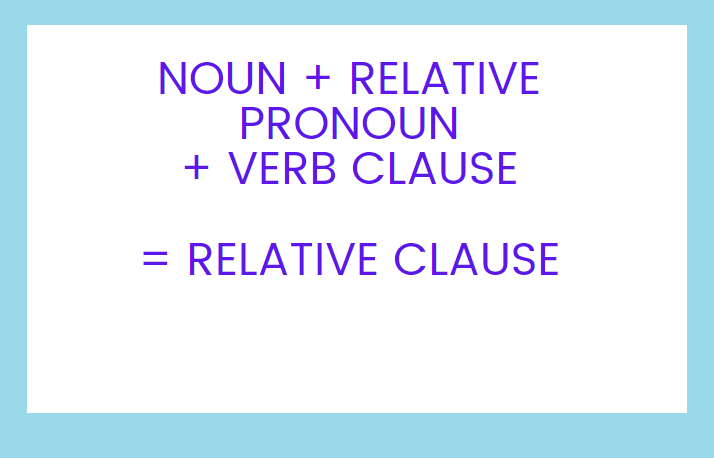What are relative clauses?
What is a clause?
A clause is a part of a sentence.
For example if we say ‘John likes orange but Peter likes banana.’
‘John likes orange’ is a clause, the first part of the sentence, and ‘Peter likes banana’ is a separate clause, but they are joined together to make one sentence with the word ‘but’. Such words which join clauses are called ‘connectors’ or ‘conjunctions’.
The technical definition of a clause is a group of words with a ‘SUBJECT’ and a ‘VERB’.
The subject is the person or thing that is doing an action, and the verb is the action.
So in the example above, ‘John likes orange’ is a clause because John is a subject and the action he is doing is that he ‘likes’ oranges.
What are relative clauses?
A relative clause is a clause with a relative pronoun.
The main relative pronouns are who, which, that, when and where.
They provide more information about a person/thing. Every person or thing has a name and in English grammar, names are called ‘nouns’.
For example in a conversation you mention the name ‘Peter’. Your friend then says, ‘Who is Peter?’
You can then explain by saying ‘Peter is the man who lives next to me.’
So Peter is the noun (name) and the word ‘who’ provides us more information about Peter. It (the word ‘who) relates to Peter, so it’s a ‘relative pronoun’.
Here are some other examples:
‘Jonathan is the man who teaches us Spanish.’
‘ Room 412 is the place where we study science.’
‘A broom is a thing which you use to clean the floor.’
So in the sentences above ‘Jonathan’, ‘Room 412’ ‘broom’ is the noun which we are talking about or the ‘subject’ of the sentence.
The words, ‘who’, ‘where’, ‘which’ are the words that relate back to these nouns and tell us more information about them.
The phrases, ‘who teaches us Spanish‘, ‘where we study science‘ and ‘which you use to clean the floor‘ are all relative clauses as they are all parts of a sentence which start off with a relative pronoun.
Two types of relative clauses, defining and non-defining.
So a relative clause is a phrase or part of a sentence that provides us information about a ‘noun’.
The information could be of two types.
- Defining
- Non-defining.
Defining means that it tells us who the person/thing is. We don’t know who the person/thing is but the defining relative clause explains who/it is.
Non-defining means we know who the person/thing is, but it tells us more extra-information, and sometimes this extra information may not even be important and can be removed from the sentence.
Examples of defining relative clauses.
Some examples of defining relative clauses in a sentence, and the defining relative clause is in green.
‘Bogota is the city which is the capital of Colombia.’
‘ George Washington is the man who was the first president of the USA.‘
‘ 2001 is the year when I was born.‘
‘Yuki’s cafe is the place where I go to have lunch.‘
Examples of non-defining relative clauses.
Some examples of non-defining. In these example we already know who the person or thing is. We put a comma at the beginning and end of the relative clause, which is in green.
‘Shakespeare, who was born in the west of England, was a great writer.’
The phrase ‘who was born in the west of England’ is the relative clause here, but it just adds some extra information and is not essential to knowing who Shakespeare was or what he did.
It could also be removed from the sentence and the sentence would still have meaning.
So the original sentence is like this:
‘Shakespeare, who was born in the west of England, was a great writer.’
If we removed the relative clause:
‘Shakespeare, who was born in the west of England, was a great writer.’
It would look like this:
‘Shakespeare was a great writer.’
Here are some more examples of non-defining relative clauses in green, with a sentence without the relative clause under them.
‘New York, which has a park called Central Park, is very big.’
‘New York is very big’
‘Sara, who lives in Sydney, loves reading.’
‘Sara loves reading.’
‘Matthew, who plays football, studied in Dublin.’
‘Matthew studied in Dublin.’
If you have any questions or comments please share in the comments section below!

